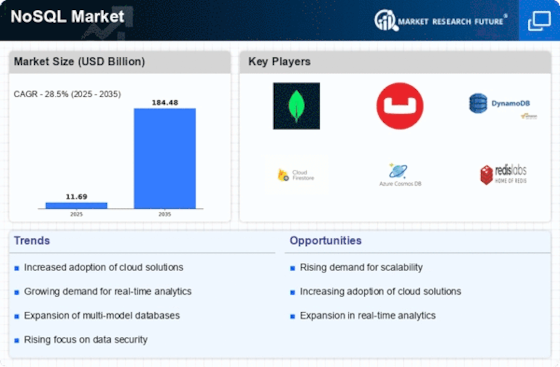Top Industry Leaders in the NoSQL Market

The Competitive Landscape of the NoSQL Market
The NoSQL market is experiencing tremendous growth, driven by the ever-increasing volume of data generated by modern applications, reflecting the critical role NoSQL databases play in handling massive datasets and diverse data structures.
Several key players dominate the NoSQL landscape, each with distinct strengths and target audiences. Here are some of the frontrunners:
- Couchbase Inc
- Oracle Corporation
- ScyllaDB, Inc
- Riak
- Aerospike Inc
- IBM Corporation
- Objectivity, Inc
- Neo4j, Inc
- The Apache Software Foundation
- Progress Software Corporation
These companies compete by adopting various strategies. MongoDB, for instance, focuses on developer experience and a comprehensive ecosystem of tools and services. AWS leverages its existing cloud infrastructure to position DynamoDB as a convenient choice for AWS users. Open-source players like Cassandra and Couchbase prioritize community building and offering feature-rich solutions at lower costs.
Several factors influence market share analysis in the NoSQL space. Here are some key considerations:
-
Database Type: Different NoSQL databases cater to specific needs. Document stores like MongoDB are popular for ease of use, while key-value stores like Redis excel in speed. Choosing the right type depends on the specific application requirements.
-
Scalability: The ability to handle growing data volumes is crucial. Horizontal scalability, where adding more nodes increases capacity, is a significant advantage for NoSQL solutions.
-
Cloud Integration: Cloud-based NoSQL databases like DynamoDB offer ease of deployment and management, especially for businesses already invested in cloud infrastructure.
-
Open Source vs. Proprietary: Open-source options like Cassandra offer lower upfront costs but may require more technical expertise to manage. Proprietary solutions like MongoDB provide more robust features and support but come with licensing fees.
Beyond established players, new and emerging companies are making their mark in the NoSQL market:
-
Cosmos DB (Microsoft Azure): Microsoft's cloud-based NoSQL offering competes directly with DynamoDB, providing scalability and integration with other Azure services.
-
ScyllaDB: An open-source, high-performance NoSQL database built on top of Cassandra. ScyllaDB focuses on improved scalability and performance compared to the original Cassandra.
-
FaunaDB: A serverless NoSQL database offering a GraphQL interface for easy data querying. FaunaDB targets developers seeking a simplified approach to managing NoSQL databases.
The current trend sees NoSQL companies investing heavily in:
-
Security and Compliance: As data privacy regulations become stricter, NoSQL vendors are prioritizing robust security features and compliance certifications.
-
Cloud Integration: With cloud adoption on the rise, NoSQL providers are strengthening their integration with major cloud platforms, offering seamless deployment and management options.
-
Hybrid and Multi-Cloud Support: Businesses are increasingly using hybrid and multi-cloud environments. NoSQL vendors are adapting their offerings to support these complex deployments seamlessly.
-
Developer Tools and Services: Simplifying development and management is a key focus. NoSQL companies are investing in developer tools, automation features, and managed services to make their solutions more user-friendly.
The NoSQL market is a dynamic and rapidly evolving space. By understanding the key players, their strategies, and the factors driving market share, businesses can make informed decisions when choosing a NoSQL solution that best aligns with their specific needs and infrastructure. As the market matures, we can expect continued innovation, with a focus on security, cloud integration, and developer experience being the cornerstones of future growth.
Latest Company Updates:
- Industry analyst reports: Gartner, Forrester, and IDC all publish research on the big data market, which often includes NoSQL databases. You can find these reports on their respective websites, although they may require a paid subscription.
- Database vendor websites: Major NoSQL database vendors like MongoDB, Cassandra, and Amazon DynamoDB publish blog posts and press releases about new features, partnerships, and industry trends.
- Technology news websites: Websites like ZDNet, TechCrunch, and VentureBeat often cover big data and NoSQL news.










